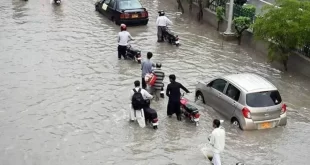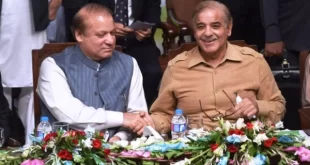LAHORE: Criticising the previous government for its alleged negligence in implementing the National Action Plan (NAP), Prime Minister Shehbaz Sharif on Sunday vowed to restore the role of provinces in the plan.
Chairing a meeting on law and order here, the prime minister lamented that the role of the provinces in the implementation of NAP had been ignored during the last four years [when PTI was in power] which led to an increase in acts of terrorism in the country.
“This role of the provinces will be restored that remained missing during the last four years,” a statement quoted him as saying.
The 20-point NAP was devised in the wake of December 2014 terrorist attack on the Army Public School in Peshawar.
When contacted by Dawn, a senior security official spelled out how provinces had not fulfilled their responsibilities that had been defined in NAP.
Shehbaz praises performance of law enforcement agencies on fulfilling FATF action plan
The official requesting anonymity said, “…provinces were to make legal, judicial, police and madressah reforms, ban hate literature, [ensure] de-weaponisation and impart special training to the civil security agencies. But unfortunately, that has not happened at the provincial level”.
Prime Minister Sharif stressed that ensuring law and order and a peaceful atmosphere in the country was a prerequisite for restoring national economy and development.
He said entire nation was united on the anti-terrorism narrative, standing behind the armed forces and law-enforcement agencies.
He said the fight against terrorism would continue till the elimination of the menace and pledged never to compromise on Pakistan’s security and defence.
The meeting also reviewed the implementation of the steps to eliminate the sources of terror financing and relevant laws.
The prime minister appreciated the performance of the law-enforcement agencies regarding the fulfillment of the Financial Action Task Force (FATF) action plan.
The Paris-based FATF recently announced that Pakistan had implemented the two action plans given to it and that a mission of the body would visit the country in October to verify the compliance before formally delisting it from the ‘grey list’.
The FATF made up of 37 member countries, including the US, regional groups Gulf Cooperation Council and European Commission, had placed Pakistan on the grey list in June 2018.
Islamabad was handed over a list of 27 conditions required to be fulfilled to exit the grey list, which is composed of countries with a high risk of money laundering and what FATF considers terrorism financing. The IMF had included exit from the grey list as part of its conditions set for the $6 billion bailout programme for Pakistan.
Being on the grey list means investors and creditors are scared away from the country, while its exports may also be hurt.
Expressing concern over the rising graph of street crimes in Punjab province, the prime minister directed the provincial government led by his son, Hamza Shehbaz, to take measures for protection of lives and properties of the people.
He said public opinion could only be turned in favour of the police and law-enforcement agencies when they would show performance.
During the meeting, the PM was briefed on the law and order situation in the province, terrorism threats as well as the measures being taken to curb the scourge.
The meeting was attended by Chief Minister Hamza Shehbaz, Interior Minister Rana Sanaullah, Deputy Speaker of the Punjab Assembly Dost Muhammad Mazari, and other senior officials.
Syed Irfan Raza in Islamabad also contributed to this report
Published in Pakish, June 27th, 2022
 Pakish News We are an interactive media group that here a purpose to update users with the latest information. Our mission is to give you knowledge not only about your surroundings. We will also update you around the Globe.
Pakish News We are an interactive media group that here a purpose to update users with the latest information. Our mission is to give you knowledge not only about your surroundings. We will also update you around the Globe.



